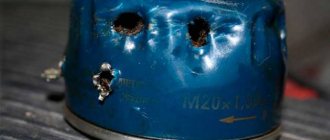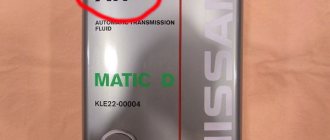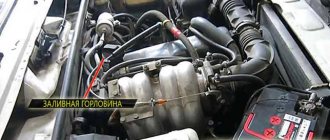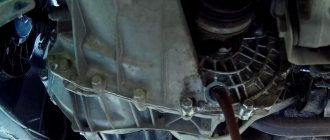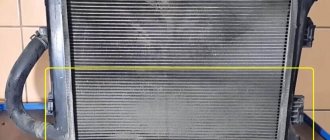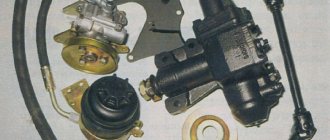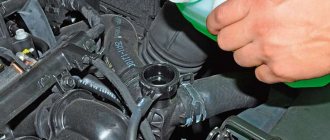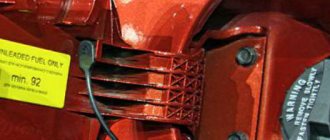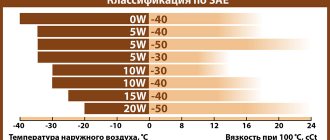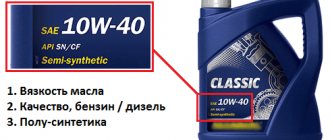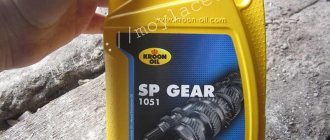DIREN-88 Was 2 hours ago
Sergey Sergeevich, 32 years old Do I drive a Hyundai Solaris by DirenGarage ProjecT? Moscow, Russia
Message
I’m doing this post purely for the sake of it, I took it from the Internet. The replacement schedule is a purely individual matter, so I don’t pay attention to it. And I posted the table purely for understanding what kind of liquid and in what volume.
Full size
Code of original power steering fluid (1l): 03100-00130
18
Previously Replacing the Hyundai Solaris generator Next TO-12 (164761) - note
Suitable oil according to Hyundai Solaris approval
In general, there are several suppliers of motor oil for the Hyundai automaker, depending on its geographical location. Among them are: Shell, Motul, Mobil, Lukoil. As already mentioned, Shell Helix is the supplier of Hyundai Solaris oil to the plant in St. Petersburg.
Original oil for gasoline engines
| Hyundai Premium LF Gasoline 5w20 Article - (05100-00451) 4l | Hyundai Turbo SYN Gasoline 5W-30 Article –(05100-00441) 4l |
Approved analogues by tolerance
Manufacturers strongly recommend that you continue to use the oil that was originally filled from the factory. But you can choose other synthetic oils that meet the standards. The viscosity should be 5W20.
| 5W-30 MOTUL 8100 X-clean Article 106377 5l | 5W-30 Mobil ESP Formula Article 152621 4l |
| Lukoil Genesis Armortech 5w30 4l. (Art. 1538770) | Shell Helix Ultra ECT C3 Article 550042847 4l. |
For older models produced before 2006, it is recommended to use semi-synthetic oils - 10W40.
Choosing engine oil - video
This is interesting: What kind of oil should be poured into the mr20de engine
Choosing an oil base
Choosing engine oil for Hyundai Solaris
More often, the question of selecting oil for Hyundai Solaris most likely relates to problematic engines. Mineral, semi-synthetic and synthetic oils can contain the same properties for operation, can be endowed with the same classifications and specifications and have differences only in thickness and differences in bases. Oils of different thicknesses, with the same operating properties, can in certain situations temporarily solve specific problems of a worn-out engine.
For example, a mineral oil SAE 15W - 40 will have a slightly higher kinematic viscosity at 100 degrees when compared with most synthetic oils with a viscosity of 5W - 40. This way, in a maintained engine at operating temperature, you can create a thicker and stronger oil film, thus providing protection against further wear and stabilization of system components. The level of oil waste is reduced and an engine using mineral oil, when compared with semi-synthetics and synthetics, creates the appearance of normal operation.
When to change the oil. Replacement timing
Many are sure that the oil is changed every 15,000 km. Dealers themselves often talk about this and it is also written in the operating manual in section 7 on page 5. We are only talking about normal operating conditions.
Operating manual, oil change intervals under normal conditions
In the same manual there is another entry about replacement periods: in the same section 7 on page 16 it talks about a period of 7500 km.
Operating manual, oil change intervals under severe conditions
What applies to difficult conditions?
There is another fairly popular publication that many people refer to. It talks about replacement periods of 15 thousand km and even 20 thousand km. There are no amendments related to operating conditions. Therefore, it is not clear why in one place the replacement is at 15,000 km, and in another - at 20,000 km.
Oil change intervals are at 15 thousand and even 20 thousand.
In modern urban conditions, calculating mileage only by kilometers is no longer enough. Many new cars also take into account engine hours along with mileage. And depending on what comes first, a message is issued indicating the need to change the oil.
Our car only has an odometer. If you change the oil before 15,000, this will compensate for the lack of engine hour metering when operating in the city. 15,000 km in the city and 15,000 km on the highway in terms of engine hours is a big difference.
Also, shortening the interval allows you to protect the engine in case of using counterfeit oil or oil filter, which all markets and stores are littered with today. A fake filter has a much smaller filter element and by 15 thousand km (even if the oil itself is real) there will be no filtration.
What oil does Hyundai recommend for Solaris?
The following is a list of engines and suitable engine oil characteristics for these engines.
Generation 1 (2011-2017)
- SAE classification for 1.4 107 hp engine. With. (gasoline, manual/automatic, model year – 2011-2017) – 5W-30, 5W-40.
- SAE classification for 1.6 123 hp engine. With. (gasoline, manual/automatic, model year – 2011-2017) – 5W-30, 10W-30.
Generation 2 (since 2017)
- SAE classification for 1.4 100 hp engine. With. (gasoline, manual/automatic, year of manufacture – since 2017) – 5W-20, 5W-30.
- SAE classification for 1.6 123 hp engine. With. (gasoline, manual, automatic, year of manufacture – since 2017) – 5W-30, 10w-30.
List of works during maintenance 4 (mileage 60,000 km)
- Repeat all points of maintenance 1 and maintenance 2 - replace the engine oil, oil and cabin filters, as well as brake fluid.
- Replacing the fuel filter. Article number - 311121R000, average cost is about 1200 rubles .
- Replacing spark plugs. Iridium spark plugs 1884410060, which are more often installed in Europe, will cost 610 rubles apiece. But if you have regular nickel ones, article number 1885410080, average cost about 325 rubles , then the regulations will have to be halved, to 30,000 km.
Counterfeit oils. How to spot a fake
Today there are no known oils that have not been counterfeited. There are two types of counterfeit products on the market and in online stores. The first and most dangerous for the engine is oils that precipitate, the second is real cheap low-grade oils in higher-grade packaging.
Why is the first type of oil dangerous?
- The piston rings coke very quickly, which leads to oil consumption.
- Such oil burns in the engine, which clogs the catalyst honeycomb.
- The CVVT clutch valve mesh becomes clogged very quickly.
- The thermal load on the engine increases due to large deposits of such oil.
Why is the second type of oil dangerous?
- Quickly loses its properties. Usually for 4,000 - 6,000 km.
- Prone to carbon formation after a mileage of 4,000 - 6,000 km.
- It also begins to burn out, but not immediately but, as a rule, after losing its properties.
- The piston rings coke after a run of 4,000 - 6,000 km, but not as actively as the first type.
The first type will reveal itself very quickly if you are careful. Before adding new oil, look under the oil filler cap.
Remember or take a photo of what's underneath
For example, before the oil change it was like this
Over the course of 1000 to 2000 km, we periodically look under the cover and compare what is with what was. In summer, if the oil is counterfeit, this process goes faster, in winter it goes slower. If it is a 'hard' counterfeit, sediment will appear in the specified range.
We also additionally control the oil level. In the summer, such rubbish burns very badly, which will be noticeable by the dipstick. If before the replacement the engine did not consume oil, and after replacing it with a new one, the level suddenly began to melt before our eyes, then this is also a sign of low-quality oil. Always remember the level after changing the oil to a new one!
After replacement and a short mileage, multiple oil deposits formed
If you run into this, don’t use flushing oil - you’ll only make it worse! It is better to sharply reduce the replacement time to 3000-5000. After a certain number of replacements (depending on the cleaning properties of a particular oil), the engine will become cleaner.
This type of counterfeit can be identified in advance without pouring it into the engine. But it will take effort. The oil will need to be heated on a hotplate or burner. If it boils during heating or evaporates intensely, you don’t need to continue. We heat it for about 10 minutes, if it’s a “hard” kind, then it will be “porridge” as in the photo.
After heating, this oil turns into coke or porridge.
Unfortunately, the second type cannot be determined in this way. The oil here is of better quality. And it passes such a simple test. What to do?
This oil will also show itself, but at a higher mileage of 4 - 6 thousand km. It is also prone to carbon formation, but gradually and in much smaller quantities than frankly left-handed oil.
Usually, by 4 - 6 thousand km, light varnish deposits begin to appear
After 6 thousand km the process accelerates significantly
I will note a tendency to burn out as the mileage increases. That is, at first the level is stable, but as the mileage increases, it begins to slowly decrease. The closer to 8-10 thousand km, the more the oil burns.
I can recommend the YouTube channel Oil Club Torcon. You can look for a review of your specific oil there.
The danger of counterfeit oils
Car manufacturers and service technicians constantly talk about the quality of lubricants. This is the case when savings are not justified. If the store does not have the original product, choose an analogue from a well-known brand that guarantees quality.
Among the fakes, oils that precipitate most often come across. Such a lubricant will quickly coke the piston rings and clog the clutch valve mesh. Due to the large volume of deposits, the load on the engine increases and fuel consumption increases.
The second type of counterfeit: the characteristics of the oil are significantly lower than those indicated on the packaging. The lubricant quickly loses its properties. After 4000–6000 km you will have to completely change the oil, otherwise the engine will become covered with soot.
Changing the lubricant yourself
You can change consumables yourself; you don’t have to go to a service station to do this.
Required Tools
What you will need to change the fluid:
- set of wrenches and sockets;
- an oil filter remover or screwdriver;
- new oil;
- new filter device;
- gasket for the drain plug;
- an old bucket or basin into which the “working off” will be drained;
- clean rags.
User Roman Smirnov showed in his video how consumables are replaced in the Solaris lubrication system.
Stages of work
How to change the lubricant in the Solaris internal combustion engine with your own hands:
- Prepare your car in advance. Warm up the engine to a temperature of about 60-70 degrees and take a test ride. This is necessary so that the lubricant becomes more viscous and disperses through all channels of the lubrication system.
- Stop the engine and open the hood. In the engine compartment on the cylinder head you will see a filler neck; you need to unscrew its cap. There is no need to add oil. The cap is unscrewed in order to relieve pressure in the system and speed up the draining procedure.
- Reach under the bottom of the car and find the drain hole on the cylinder block. If the car is equipped with oil pan protection, it must be removed by unscrewing all the bolts. Place a basin or bucket under the drain hole, then unscrew the plug with a wrench.
- The process of draining the waste substance will begin. Wait until the lubricant is completely out of the system, then tighten the plug.
- Remove the oil filter. Try unscrewing it counterclockwise with your own hands. If it doesn’t work, use a dismantling tool; such a key can be purchased at any car store. If you don't have one, you can pierce it with a screwdriver and then use it as a lever to unscrew the device. Please note that you need to pierce the housing as close to the bottom of the filter as possible, away from the threads, so as not to damage the internal combustion engine components.
- Pour new oil into the system. Take a new filter and add about 100-150 ml of liquid to it. The sealing rubber located next to the thread must be treated with a layer of lubricant, this will prevent the filter device from sticking to the seat. Install the filter and screw it on without much effort.
- Reinstall the engine protection and check the lubricant level in the system. According to the dipstick, the volume of the substance should be between the MIN and MAX marks.
- Start the engine and perform a test drive. After this, check the lubricant level again.
1. Find the drain plug under the bottom of the car, marked in red. 2. Unscrew the bolt with a wrench, first placing a container under the hole. 3. Drain the old lubricant from the system and fill it with new oil.
This is interesting: How long does it take to charge a car battery 75
Instructions
- Place the car on a flat, horizontal surface. Apply the parking brake during maintenance.
- Warm up the engine to operating temperature, then let it cool for 10-15 minutes. During this time, the liquid will drain into the engine oil pan.
- Pull out the dipstick and unscrew the filler hole. Mining drains much faster if there are through passages for air.
- Raise the car with a jack, and place a container for draining waste under the drain hole. It is ideal to have an inspection hole at your disposal, but if you don’t have one, you can get by with a regular jack and support stands.
- Drain the waste liquid after unscrewing the drain bolt. Be careful, the liquid may still be hot on your skin.
- Unscrew and replace with a new oil filter. Before installation, you need to soak it a little with fresh water and lubricate the O-ring.
- We install a new sealing washer on the drain bolt and screw it into place. The sealing washer is a disposable, consumable material. Do not over-tighten the drain bolt as there is a high chance of stripping the threads.
- Fill in engine fluid using the dipstick as a guide.
- Warm up the engine and check the level on the dipstick again. Usually after warming up the level drops a little.
Filling tanks for fuel and lubricants Hyundai Solaris
| Filling/lubrication point | Refill volume | Name of oil/liquid |
| Fuel tank | ||
| Before restaling | 43 liters | Gasoline no less than 92 |
| After restaling | 50 liters | |
| Engine lubrication system (including oil filter) engines: | ||
| 1.4 liters | 3.3 liters | Oil type according to SAE^ 5W20 or 5W30; via API: SM |
| 1.6 liters | According to ILSAC GF-4 | |
| Engine cooling system: | ||
| 1.4 liters | 5.3 liters | Antifreeze safe for aluminum radiators with distilled water |
| 1.6 liters | ||
| Transmission | ||
| Manual transmission | 1.9 liters | According to API: GL-4; according to SAE: 75W85 |
| Automatic transmission | 6.8 liters | Diamond ATF SP-III or SK ATF SP-III |
| power steering | 0.9 liters | Ultra PSF-3 03100-00100 or Ultra PSF-3 03100-00110 |
| Brakes | 0.8 liters | DOT-3 or DOT-4 |
What and how much to fill in Hyundai Solaris
Engine oil
The Hyundai Solaris is equipped with two engines of 1.4 liters and 1.6 liters, both petrol. The volume of filling liquids is the same, it is equal to 3.3 liters. SAE oils can be used 5W20 or 5W30, at your discretion. According to API only SM, and according to ILSAC GF-4. Either pour original, branded oil, or buy a different one, but so that everything is normal.
Oil for automatic transmission and manual transmission.
For a manual transmission we buy oil according to API GL-4, and according to SAE 75W85, you need to fill the oil in the box with 1.9 liters.
For automatic transmissions, the fluid is Diamond ATF SP-III or SK ATF SP-III. Automatic transmission volume = 6.8 liters, more will be required than for a manual transmission.
The power steering fluid is Ultra PSF-3 03100-00100 (to make it easier for you, it is red), or fill it with Ultra PSF-3 03100-00110 (light brown). Fill in 0.9 liters.
Coolant.
We fill in Antifreeze safe for aluminum radiators with distilled water, pour in a total of 5.3 liters.
Brake system
The brake fluid is DOT-3 or DOT-4, it makes no difference, but the volume is 0.8 liters.
Fuel.
Before the restaling, the car’s tank was 43 liters, but after its release in 2022, the car’s tank was 50 liters.
Gasoline for both needs to be filled with at least 92, but for better engine performance it is better to pour 95 gasoline.
List of works during maintenance 3 (mileage 45,000 km)
- Repeat routine maintenance maintenance 1 - change the engine oil, oil filter and cabin filter.
- Replacing the coolant. The filling volume will be at least 6 liters of coolant. It is required to fill in green Hyundai Long Life Coolant antifreeze. The catalog number of the package for 4 liters of concentrate is 0710000400, the average price is approximately 1890 rubles .
- Replacing the air filter. Catalog number - 281131R100, average price is approximately 420 rubles .
Prices for the service
Many car owners are interested in how much it costs to change the oil in a Hyundai Solaris. The price depends on the service center you contact. The specialists of our technical centers will change the oil in the Hyundai Solaris engine quickly and efficiently. If during operation we discover engine malfunctions, we will definitely inform you about them. Contact our managers to get more detailed information.
Good afternoon. Today we have Hyundai Solaris in our service center. He came for a routine inspection and oil change. In this article, we will tell you how to drain the old oil and fill it with new oil into the 1.6 Hyundai Solaris engine. We will also show you how to replace the oil filter. It is advisable to change the oil every 7-8 thousand kilometers.
| Article: Oil volume 3.7 liters - 5W30, oil filter - 26300-35503, oil filler plug gasket - 21513-23001 |
| Tools: To change the oil on a Hyundai Solaris, you will need a socket set and an oil filter puller |
| Draining and changing oil in the Hyundai Solaris engine: |
| First of all, we lift the car or drive into a pit. Then, if there is engine protection, remove it. Then use a wrench to unscrew the drain plug on the crankcase. |
| We wait until all the oil drains and tighten the drain plug with a new gasket. |
| Then unscrew the old oil filter. After that, fill the new one with oil and screw it into place. |
| After this, pour fresh oil into the engine. About 3.7 liters. The entire process of draining and changing the oil in the 1.6 Hyundai Solaris engine took us about 30 minutes. After this, start the engine and wait until the oil can goes out. Good luck on the roads! |
Video guide for changing the oil in the 1.6 Hyundai Solaris engine:
How to change lubricant
When it comes to replacing the lubricant in a Hyundai Solaris with your own hands, you need to prepare lubricant, a set of keys, a filter puller, a rag and a brush, as well as an empty container for collecting used lubricant. How much lubricant will need to be added? Both engines require 3.6 liters. The characteristics of the motor fluid are already known. It is important to purchase an original lubricant and not a fake. If you want to get acquainted with the replacement process visually in order to find out everything in more detail, you can find a lot of video materials on this topic on the Internet.
The work will take place in a certain sequence.
- Changing the lubricant in the Hyundai Solaris is carried out with the engine turned off - it is better not to delay the work for a long time until the engine oil has cooled down.
- The hood is lifted and the engine oil filler cap is unscrewed. From below, the engine crankcase is cleaned of dirt - in the area of the plug that closes the hole for draining the lubricant.
- Using a 17mm spanner, unscrew the drain plug 1-2 turns. An empty container with a volume of 4 liters is placed under it.
- The plug is completely unscrewed and the lubricant is poured out. You have to be careful when doing this - the lubricant is hot. You need to wait a while until everything flows out.
- It is necessary to check the condition of the aluminum washer that seals the drain plug. If it has defects, it is better to replace it with a new one.
- After wiping, the plug is twisted and tightened. The engine crankcase is wiped with a rag to remove oil leaks.
- The container again needs to be placed under the oil filter. It turns away by rotating counterclockwise. You need to loosen the filter with a puller, then you can unscrew it by hand.
- The oil filter is removed. Dirt and lubricant leaks are removed from the filter seat.
- Apply engine oil to the rubber ring next to the filter inlets. You can fill it with lubricant to about half the volume. The oil filter is screwed in by hand. However, you should not overdo it so as not to damage it.
- You will need to pour 3.3 liters of engine fluid into the engine through the filler neck. After this, the neck cap is screwed clockwise.
- We start the engine for a couple of minutes. The low oil pressure warning light in the power unit should go out. In addition, there should be no lubricant leaks from under the plug and filter.
- The engine stops. After some time, when the lubricating fluid drains into the oil pan, you need to check the lubricant level and top up if necessary. The level on the dipstick should be in the middle position, between the L (minimum) and H (maximum) marks.
Do-it-yourself replacement of engine fluid in a Hyundai Solaris is completed. As can be seen from the description, even a novice car enthusiast can do this. Now you can drive 7-8 thousand kilometers until the next replacement.
The last restyling of Hyundai Solaris cars, if we talk about generation “1”, was carried out in the summer of 2014. Sedans and hatchbacks of this family have since been produced unchanged. The assembly is carried out by a Russian plant built in St. Petersburg. Some components are supplied from Korea and the Czech Republic, and the engines are produced by a company based in China. The oil in the Hyundai Solaris engine from the factory can be one - Shell Helix Ultra SN with a viscosity of 5W20. This option is used for all internal combustion engines, regardless of volume.
The owner of a Hyundai Solaris with a G4FC engine talks about choosing engine oil. Look at the video below:
( 2 ratings, average 4.5 out of 5 )
The more expensive the better
As for the question of price and quality, it is impossible to answer it unequivocally. Bench and field tests show little difference between expensive oils and economy class products. This is due to the fact that similar base oils are taken as a basis, and differences in characteristics are obtained due to the percentage of one or another group of additives.
Often, liquids from a world-famous manufacturer will cost significantly more than little-known analogues. However, the percentage of counterfeit products from well-known brands is quite high, but few people will counterfeit unfamiliar brands. To avoid encountering low-quality materials, you should purchase lubricants only in specialized stores representing a particular company.
Based on the recommendations of the manufacturer, it is quite possible to fill the Hyundai Solaris with budget category lubricants.
This includes products from the following domestic companies:
- Lukoil;
- Rosneft;
- TNK.
If you wish, you can also purchase original oil, which will definitely be the best option.
If you cannot find it, you will be required to purchase a product with the most suitable characteristics.
Oil for Hyundai Solaris 1.4
The selection of oil for the Solaris 1.4 engine is carried out according to the same tolerance as for the 1.6, so you can use the original oil:
- Shell helix Ultra 5W30
Or choose an analogue from the list above, the main thing is not to run into counterfeit products.
How to avoid encountering counterfeit Hyundai oil
What is the replacement interval?
Car owners constantly argue about how often a Hyundai Solaris oil change is necessary. According to the manufacturer's recommendations, the engine oil is changed
- every 15 thousand km;
- 1 time per year.
It all depends on which time comes sooner. But it is also worth considering the fact that under increased operating conditions the engine consumes almost 1 liter of oil per 1500 km. Therefore, in some cases, replacement will be necessary after 7-8 thousand kilometers traveled.
Selection of filter and analogues
An original oil filter will protect your car’s engine from rapid wear by efficiently removing all kinds of particles and dirt from the engine fluid. Thanks to its qualities, the oil filter is able to make the operating conditions of the power unit as comfortable as possible.
The original filter is Hyundai 26300-35503 , which is not much higher than its analogues. If you couldn’t find a similar filter, you can use the most suitable ones:
- JapanParts FO-599S;
- Parts-Mall PBA-001;
- Mann W8017;
- Nipparts N1310510;
- Patron PF4219;
- filter Nevsky NF1019.
This is not a complete list of third-party filters that you can use when changing your oil.
What to fill?
Fans of the Korean manufacturer prefer to choose oils from Hyundai , either synthetic Premium LF (05100-00451), or semi-synthetic Super Extra (05100-00410). If this option is not available, you can choose any Shell .
